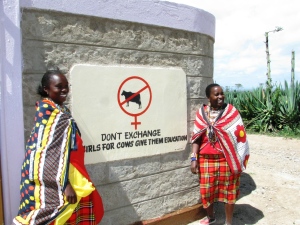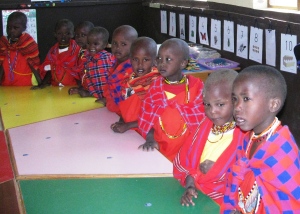Mountain Lodge is situated in Mt. Kenya National Park, and while we cannot see the top of the mountain because of the clouds, everyone enjoys the quiet nature of this wooden building overlooking a waterhole. We have whispered conversations over drinks on the balcony behind the bar and everyone turns in early after a delicious dinner.
Enroute to Mountain Lodge, we had stopped at the home of Hilary Sommerlatte, a Kenyan woman who is the founder of Oils of Africa. I met Hilary in the course of researching the gums and resins business, a potentially sustainable source of income for women in BOMA’s region. Hilary uses the resins, or sap, from the frankincense and myrhh trees, as well as other ingredients, to make wonderful essential oils and lotions. She has also developed a mosquito spray and a range of soaps. It is our hope that we will find a find a social entrepreneur who would be willing to start the distribution of her products in the U.S.
After a presentation of the distillation process by Charles, Hilary’s assistant, the Dining For Women (DFW) group is generous in their purchase of a number of products. We enjoyed box lunches in the gardens of Hilary’s beautiful brick home, and when the rain began to gently fall, it was not hard to imagine that you were instead lunching on the grounds of an English country home.
Our next stop was Maila Saba Camp, perched on the lip of the Menengai Crater, high above Lake Nakuru National Park. The camp is an income-generating project in support of the Ujima Foundation whose mission is to provide a year-long training program in the hospitality industry for young men and women who are the primary caregivers for their siblings. The Foundation hosts us for a presentation on their program, as well as an opportunity to interact with some of the very inspirational young people who must care from two to seven younger siblings. The Foundation has a good track record of finding jobs for the graduates of their programs, providing a critical income source for the young families.
The game drive in Lake Nakuru National Park provides the first sightings of rhinos, flamingos and six endangered Rothschild Giraffes, as well as very close encounters with a jackal family and baboons. When we return to the camp, our entire safari group enjoys the charming antics of Agnes and Kendi, women graduates of the Ujima program who do most of the work at the camp – from carrying luggage to serving the meals and mixing drinks. The wind blows hard in this location and it quickly turns cold. The warm fire in the dining room is a welcome sight and everyone is very happy to find hot water bottles in their beds when they return to their tents for the night.
The next morning, enroute to our final destination, Maasai Mara, the Kenyan section of the Serengetti, we stop at the Maasai village of Maji Moto (hot water) where hot springs erupt from the ground in the middle of the village. We are met at the entrance to the newly constructed Enkiteng Lepa School by Hellen Nkurayia, the founder. Hellen is a school teacher dedicated to educating and protecting young girls from early marriage and female circumcision or female genital mutilation (FGM).

Hellen Nkurayia, right, founder of Enkiteng Lepa School, with a fellow teacher at the entrance to the school
The school is one of the most impressive primary schools I have ever seen in Kenya. In contrast to most government schools, it is bright and cheerful with lots of learning materials, manipulatives for young children, colorful wall posters, and two learning corners with a garden and a nature table that displays a collection of items from the surrounding area, including the bones of a giraffe.
Even more surprisingly, the children, so far occupying two of the four classrooms, are all dressed in the traditional shukas of the Maasai. It is important to Hellen that the students receive an education but also remain connected to their culture, so on Tuesdays and Thursdays they wear shukas and on the other days they wear the traditional school uniform. Elders from the village also come to the school on a regular basis to tell the students traditional Maasai stories.
One of the classrooms is designated for the evening class given to adults and children who care for livestock during the day. Those classes are temporarily suspended because of the presence of dangerous elephants in the area. Hellen explains to us that they are waiting to finish the construction of the teacher’s housing block and dormitory for girls, so in the meantime the rescued girls are housed in the manyatta for widows provided by Salaton Ole Ntutu, a chief, medicine man and shaman.
Salaton is our host at the compound of cottage buildings and tent sites for tourists that provides an income source for the village as well as the funds for a feeding program at the school. Prior to the safari, I had made contact with Therese Baer, an American patron of the school and village, and she and her friend Sapore, another Maasai warrior, have prepared a delicious lunch for everyone. The setting of traditional buildings includes an open dining room, a kitchen preparation and storage room, and a shower with stick walls and a water tank wedged into the branches of a tree. The water is carried up from the hot springs and dumped in the tank for what I am sure must be a spectacular shower experience.
While everyone has lunch, I have a chance to visit with Hellen and she tells me about her battle against FGM and early marriage. “Mama Rungu, I have taught at so many schools, but when they find out that I am rescuing young girls, they make me leave. I have taught for 20 years in over 20 schools. Now I have the opportunity to run our own school, but it is dangerous. Just the day before I came to America to fundraise, the men of one girl’s family came to the school. They were beating me all along my shoulders and arms and when I arrived in the U.S., I was covered in bruises.” Hellen’s strength comes from the support and encouragement she has received from mentors and women’s groups in the U.S. “Without them, Mama Rungu, I would have given up a long time ago.”
Hellen takes the safari group up to the widow’s village and I sit with Salaton. He is extremely well-spoken in English, despite the fact that he cannot read or write. Salaton radiates a gentleness that is striking and deeply moving. As we discuss the tragedies of early marriage and FGM, he tells me, “Maasai men must join this fight against early marriage and FGM. But we must do it not by the spear or the rungu, we must do it by placing our hands on their arms and telling them that this tragedy must stop.” After years of meeting scoundrels who fleece tourists, I am incredibly moved by this meeting with Salaton, the son of a widow who endured the poverty and ostracism accorded mothers who have no husbands. Hellen could not do the work that she does without the support of men like Salaton.
It is hard to get the DFW group to leave but we still have over an hour’s drive to the park gate, and if we arrive after 6:30 p.m., we will not be able to reach our camp. One vehicle gets a flat tire but a few calls to well-placed friends give us the privilege of arriving late. Nick Wood, the owner of Sekenani Camp, is there to greet us, as is the manager, Lkapur, the only Rendille from northern Kenya who is the manager of a tourist facility. I have stayed here many times and it feels like a homecoming.
While I supervise the unloading of baggage, the guests climb the stairs to the dining tent where there are warm hand towels, fresh drinks and a welcoming fire. As I turn to climb the stairs, Kura arrives after a 12-hour drive from Isiolo. My protector and guardian, my partner in our work with the people of the north, has arrived safely after returning all of the Business Mentors to their villages. There will be stories to be told by the fire tonight, but right now I am just relieved to see him safe and we both climb the stairs to settle into our tents before dinner.

